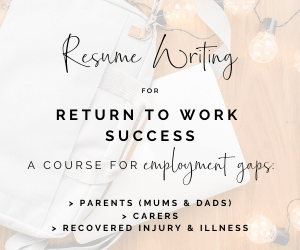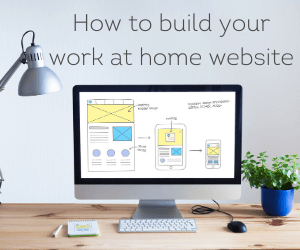Thinking about doing the work at home thing? Everyone seems to be looking for that elusive work life balance these days and working from home can give you a great way to do a lot of things you wouldn’t normally get to do in a regular 9 – 5. However, working from home is certainly not for everyone and I know quite a few people who would not do well in that sort of environment.
There are many advantages of working from home, but it also comes with some cons, and some risks as well.
Pros
- Flexibility
- No travelling
- Better for the environment
- Financially rewarding
- More productive
- Empowering
- More time with family
Cons
- Keeping kids entertained
- Isolation
- Home office set up
- Distractions
- Hard to switch off
- Lack of work community
Risks
- OH&S issues
- Security
- Less access to development opportunities
- Out of sight can mean out of mind
When deciding if the work at home route is for you it’s necessary to weigh all these up and decide what is going to work for you and your family. Only by evaluating them fully can you make the right decision that’s in your best interest.
The Pros of working from home
There are a lot of great things about working from home. There also many advantages for doing it over the traditional 9-5 workday commute.
Flexibility
Working from home allows you to manage your personal time and your work time. If you have children that you need to take care of throughout the day, you can schedule your work time around their needs. You can have a home office, yet you need not work from 9am to 5pm. You can choose to work whenever it suits you and your family.
It’s much easier to make time in your day for necessary things. Need to make a doctor’s appointment or attend your child’s school assembly? Take an hour out of your day to go and then be back working. You no longer need to take the afternoon or even a whole day off to fit things in.
When you work at home, you have much more control over your time than you do when you work outside the home. Depending on what kind of work you do, you might have absolute control or just some control, but in either event you will ultimately have more control over your time than when you work outside the home.
No travelling
Working from home means there is no longer a need for you to commute to work. Your fuel costs are decreased, as is the wear and tear on your car. You no longer need to endure heavy traffic during rush hour and you no longer have to drive home after a tiring day.
Better for the environment
Companies and employees can improve their carbon footprint when they allow people to work from home. Because you don’t have to commute to and from work, there is less carbon monoxide being released in the environment. A study conducted by Telework Exchange (a US-based corporation that aims to promote and measure the tangible results of telecommuting) showed that collectively, companies can save up to 9.7 billion of gallons in gas every year and US$38.2 billions in savings annually.
Financially rewarding
Working from home is financially rewarding. You can easily save more money because there’s very little need to commute, buy fuel, or buy lunch. It doesn’t even need to be a full time arrangement to benefit. By working from home just one day per week my husband has saved about $100 per month in fuel costs alone. You can also potentially save money on childcare if you no longer need to rely on full time daycare.
Companies can also benefit by allowing their workers more flexibility. They may find they don’t need a big a premises if they do not have all of their employees in an office, saving on rent, utilities or even office supplies.
More productive
You may still have deadlines when you work at home, however, you are in a much more relaxed environment with less distractions and fewer demands. You also have the flexibility to work a few more hours when the opportunity arises to meet your deadlines. Interruptions are also minimised as there are not colleagues around you to distract you.
There’s nothing more frustrating than attending a pointless meeting. It takes away precious time which you could have used in more productive things. Telecommuting takes away those unnecessary huddles like when your boss just wants an opportunity to brag about his personal record in golf, or update meetings when you could have just emailed it to your boss.
Empowering
Employees feel more empowered when they are given the opportunity to work at home. Working from home gives you peace of mind because you know you are never too far from your family in case of emergencies. Working from home can also reduce the amount of stress an employee feels.
More time with family
If you have children and you don’t want to put your children into care, working from home is a huge advantage for you. It not only saves you in child care fees, but it gives you peace of mind that your children are safe at home.
By not having to commute to and from work you are also saving time that can be spent with your family. This might enable you to pick them up from school, or help them with their homework, or go for trips to the park which wouldn’t happen if you’re only getting home from work when it’s dark.

The Cons of working from home
When deciding to take the plunge and become a work at home mum, it is essential to be realistic and consider the drawbacks. Working at home is not necessarily the best choice for all women and before you make to decision to embrace the flexible lifestyle, these cons need to be considered.
Keeping kids entertained
If you have school aged children, it will be relatively easy to work your day around school drop off and pick up times. Likewise, it will be much easier taking care of a newborn baby who still sleeps regularly during the day, than it will be keeping toddlers entertained and amused at home while you work. Are your kids easy to entertain or will they require lots of interaction with you to be happy? Think carefully about how you will deal with these issues, because it will determine how many hours you can realistically work if you want to keep them at home.
Isolation
Working from home can be a lonely experience, so how will you cope with spending days with very little or no adult interaction? You will need to factor this into your work from home plans and create outlets for you to get the social interaction with others, if you think you will need it.
Home office set up
If you’re working from home, you will need a place to work. Ideally this will be a dedicated home office set up – working at the dining table is not conducive to a productive environment. You will need to set yourself up to be able to do your job. This may mean the purchase of a desk, computer and any other office equipment needed to do the work. You will also need to have a reliable internet connection and be contactable by phone.
Depending on the work at home job you have chosen you will need to find out whether there are any costs involved and whether you can meet them. It will be important to look at insurance requirements, equipment needed and whether there are any laws in place that relate to building usage if you decide to work in your own home.
Distractions
Distractions can be a real drawback and there are many that can come up working from home. From children to telephones and helpful friends wanting to stop by for a chat and cup of coffee. You will need to make sure you have set a routine and work schedule in place. Make sure you have boundaries so that you can ensure that friends and family will know when you are working and when you are available. For those times when it is an emergency and they really need you to drop everything and come now, use a safe word that will signal it is a ‘real’ emergency.
When you work at home, you are shoulder to shoulder with the mess, the laundry, pets and the children. It’s easy to get side-tracked trying to take care of these things. But if everything is on a schedule (even the children, if they are home during the day), you can get much more done. You will be able to focus on work when you’re working because you won’t get side-tracked thinking about all the other things that you need to get done.
Hard to switch off
Working from home means that the work is always close by. It’s very easy to walk past your office and think that you’ll just get that one task done. Or be sitting on the couch watching tv in your downtime thinking of that project you should be doing. When you work somewhere else you can tend to leave your stresses about the job at work, but it can be very hard to switch off from work mode if all that work is just down your hallway. The distinction between work and home is blurred, especially if you are working for yourself as say, a blogger or an online store owner.
Lack of work community
When working from home you can lose that sense of belonging to a workplace’s community. Although you may have calls and online meetings with your clients or colleagues every now and then, you will be working by yourself most of the time. No bonding over coffee in the break room, no lunch together, no exchanging weekend plans with your colleagues. The lack of social interactions and sense of community can be hard for some people.
The risks of working from home
As well as pros and cons, there are also some risks associated with working from home. Whether to do with safety, security or just access to advancement or opportunities, they should be thought about in the work at home decision.
OH&S issues
All workplaces should have workplace safety and policies put in place. This can make things difficult when employees are working from home. It’s important to lean about the laws in each state regarding safe workplaces when working from home. You may find your employer will require you to put certain things in place to cover themselves and you. Check your relevant WHS regulator for details of legislation in your location.
Security
Security is a key consideration when you work from home, especially if you are working on sensitive information. Your home computer generally has less things put in place for protection of information. While encrypted Virtual Private Networks provide a good level of security, un-encrypted email and USB drives are not a very secure way of sharing information. Some companies provide a work computer or device (rather than you using your own personal computer) to help to mitigate the risks, and will assist with remote IT support. Alternatively, emerging technologies can provide similar security benefits by imitating a work operating environment using virtualisation, allowing you to work from home without reducing security.
Less access to development opportunities
Working remotely may mean that you miss out on opportunities for training and development held in your regular workplace office. This may not be as much of an issue if you are still able to get to the office easily to attend things like that but will cause problems if you can’t. Employers and managers may also accidentally leave you off things, as they’re not constantly seeing you around.
Out of sight can mean out of mind
You can sometime lose the relevance of being constantly in workplace. If people don’t see and deal with you everyday, then sometimes you might find that you are not thought of in situations. Of course, there are emails and video calls to keep in contact, but some things are just easier and quicker to explain when you are sitting right next to the person. Limited communication options can make collaborations harder.
And when your team members are all in an office and you are the only one working from home, you might miss important things that they talk about on the fly.
Working from home is not for everybody. There are still positions that require employees to work onsite and employees who want to take advantage of this arrangement should justify why they need to work from home. But as more studies show how the benefits of working from home and other flexible arrangements outweigh the disadvantages, I wouldn’t be surprised if more companies allow their employees to avail of this work arrangement. In the end, working from home would be greatly beneficial to all parties concerned however the pros, cons and risks associated with working form home need to be considering before making any arrangement.

Qualities you need when working from home
Some people handle working from home better than others. But there are a few qualities that all those who work at home successfully should have.
Organisation
Working at home requires good organisation. You must be able to handle organising your job, your home, your personal life and everything else that is in your life. You should be able to handle the myriad of details that your multi-faceted life requires. You need to be able to integrate it all and that is hard work.
Flexibility
If you are set in your ways and expect everything to go the way you think they should, you will be disappointed as a work at home mum. You must be flexible so that when a child gets sick, or the dishwasher breaks, or your invoices don’t get paid, you can handle it. You should be willing to say “yes” as much as you say “no” and be able to handle the changes in schedule well. I learnt this the hard way.
Ability to say “no”
As much as you should be able to say “yes” you must also be able to say “no”. It’s sometimes hard for people to wrap their heads around the idea that a work at home mum who stays home is working full time, that’s she’s contributing in a significant way to the family’s income.
That means that often you will be called up on to do things at school, to watch other peoples’ children, go out for a coffee or to do things that takes you away from the thing that – during the day – is the most important thing to you, and that’s work. It is your bread and butter.
To that end, then, you should be able to say “no” just as often as you say “yes”. You should find some flexibility and willingness to go with the flow, to change the plans as necessary, as well, but ultimately you should be able to reply in the negative. This quality is a necessary requirement for a successful WAHM experience.
Discipline
Do you have self-discipline? Can you work hard when nobody is looking? That quality, the ability to be disciplined about your work, is essential to be a successful WAHM.
Not everyone has self-discipline when it comes to work, and that’s not always a problem. Some people just need others around to ensure that they will do the work they are supposed to be doing. But if you work at home, there won’t be other people to support you, to encourage you to work, to join in with when it comes to work. You need to find it somewhere within yourself for self-discipline. It is hard.
Self-motivation
This goes hand in hand with discipline, but it’s a bit different. To make your self-discipline work for you, you must first have self-motivation. You should want to do your job and get to it as soon as you can each day and get yourself a routine going.
Unlike an out of the house job where there might be a boss keeping an eye on your efforts, at home it’s just you. If you aren’t self-motivated enough to get up in the morning with an eye toward what you need to get done that day – without anyone reminding you of your responsibilities – you might not be well suited to working at home. But if you are self-motivated and can keep yourself going even in the face of many bumps in the road, you might do well working for yourself at home.
Multi-tasking abilities
This is a biggie. Working at home, especially when you’re a mum, take a certain level of multi-tasking expertise. You should be able to handle the house, the partner, the kids, and the work. You should be able to handle all of it and sometimes all of it at once. If you get very stressed when things don’t go perfectly, or if you can’t focus on more than one thing at a time, working at home might not be for you.
Independence
People who work at home must have a certain level of entrepreneurial initiative. That is, they work independently and are willing to take the necessary risks to achieve some success. If you want to work at home and be successful, you too should have this independent streak.
Working at home take a myriad of personality characteristics, but these are by far the most important.






